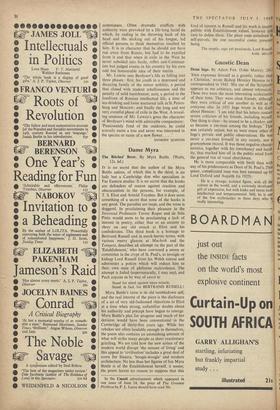Dame Myra
The Bitches' Brew. By Myra Buttle. (Watts, 12s. 6d.)
IT is no secret that the author of the Myra Buttle satires, of which. this is the third, is no lady but a Cambridge don who specialises in Far Eastern studies. It is no secret that the books are defenders of reason against reaction and obscurantism in the persons, for example, of T. S. Eliot and Arnold Toynbee. But it does seem something of a secret that none of the books is any good. The parodies are inept, and the verse is doggerel. In proclaiming their pleasure in the Sweeniad Professors Trevor Roper and de Sola Pinto would seem to be proclaiming a lack of interest in poetry, either that or an anxiety to cheer on any old smack at Eliot and his confederates. This third book is a homage to Bertrand Russell and in mock-heroic terms, with various merry glances at Macbeth and the Tempest, describes ah attempt on the part of the 'Establishment,' who have convened a coven or committee in the crypt of St. Paul's, to inveigle or kidnap Lord Russell from his Welsh retreat and administer a potion which will reduce him to their own state of philistine malevolence. The attempt is foiled (supernaturally, I may say), and Puck enjoins us by way of envoi to
Stand for mind against mere muscle, Stand, in fact, for BERTRAND RUSSELL!
Myra Buttle's verse is its old tumbledown self, and the real interest of the piece is the disclosure of a set of very old-fashioned objections to Eliot at a time when strong, unfamiliar doubts about his authority and precept have begun to emerge. Myra Buttle's plea for progress and much of her derision would have been conventional in the Cambridge of thirty-five years ago. While her rebukes are often laudable enough in themselves, the poem also contains an astonishing amount of what will strike many people as sheer reactionary grizzling. We are told how the new noises of the modern world disrupt 'the minuet of living' and this appeal to 'civilisation' includes a great deal of scorn for Sinatra, 'boogie-woogie' and modern architecture. No less than her figures of fun Myra Buttle is of the Establishment herself, it seems; the poem leaves no reason to suppose that this In the Cassell advertisement which appeared in our issue of June 24, the price of The Greatest Problem by F. L. Lucas should have read 30s.
kind of interest in Russell and his work is incom- patible with Establishment values, however you care to define them. The piece ends somehow In self-parody, the one successful comic presence being The sceptic, sage yet passionate, Lord RussCli• KARL Mill


























































 Previous page
Previous page